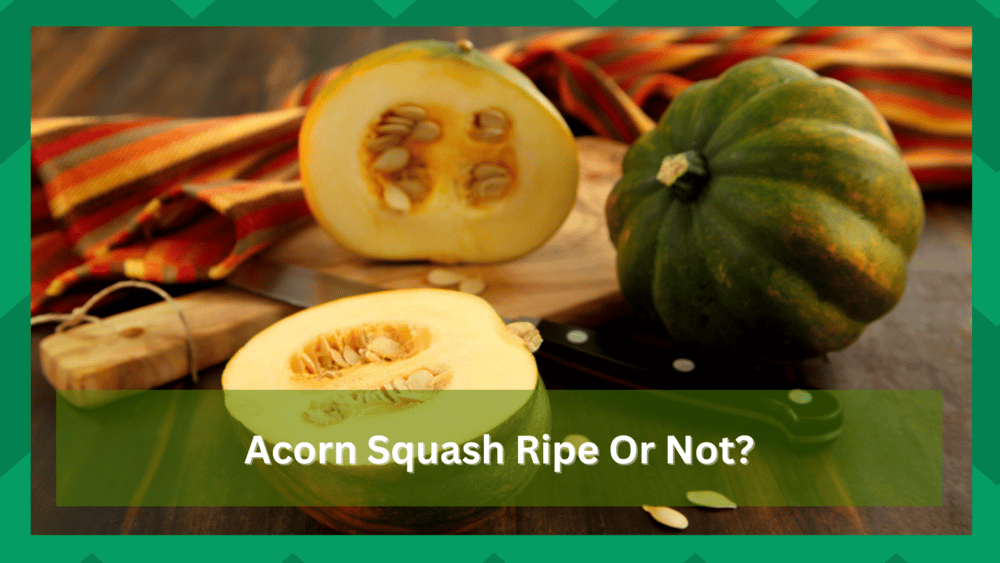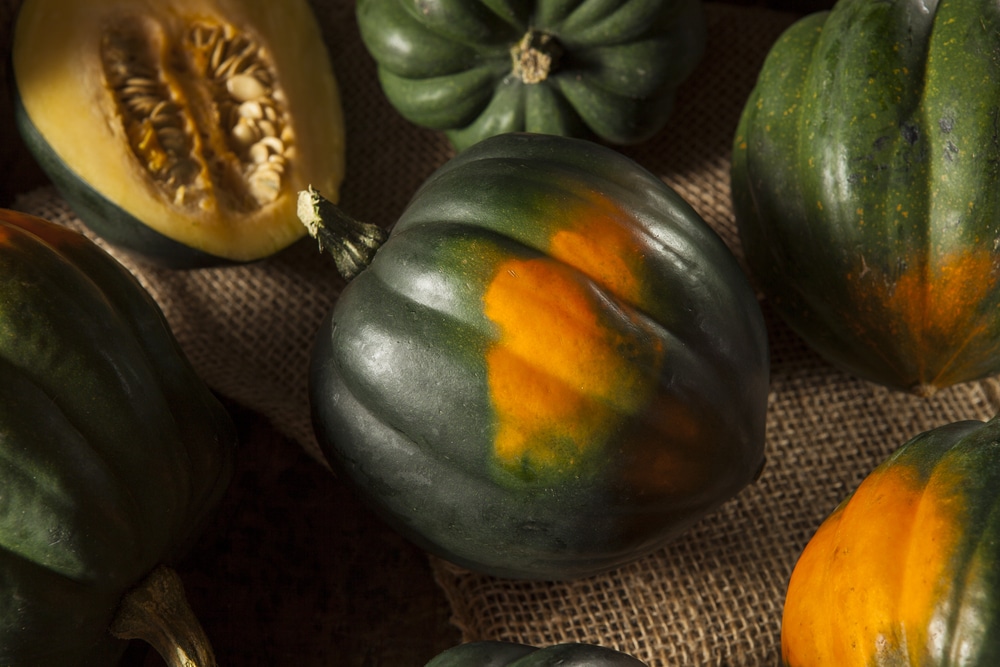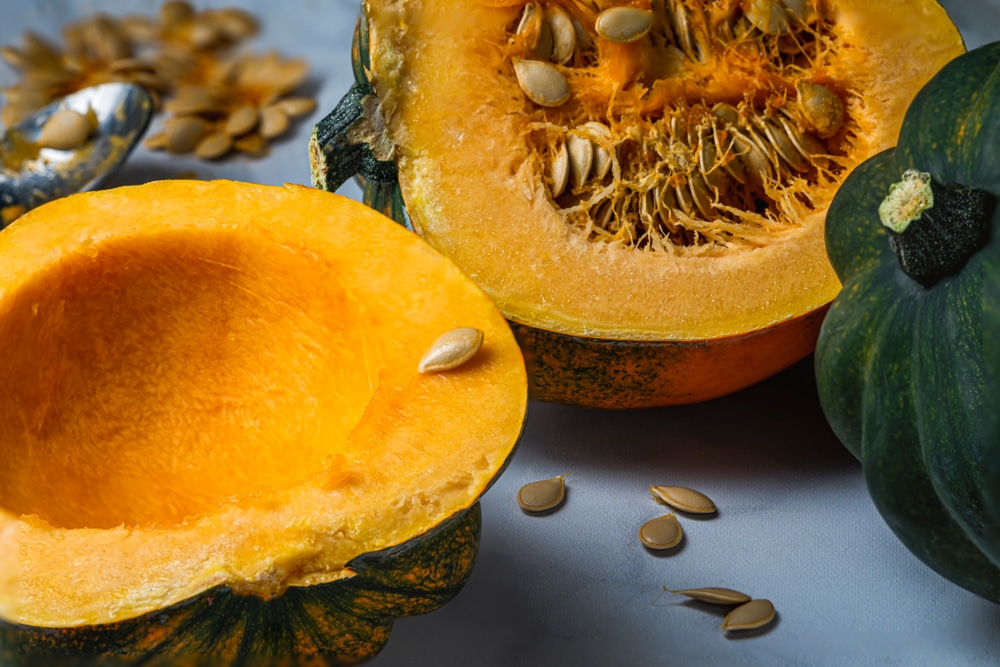
Acorn squash, also known as the Winter Squash or pepper squash, has longitudinal creases on its outside surface and sweet yellowish flesh inside, originating in North and Central America.
Even though considered a winter squash, it belongs to a similar genus as all the summer squashes, such as zucchini.
The fruit is a part of the three-sister gardens, more like staple corn. It includes squash, pole beans, and corn. They are all interplanted for benefits that they supply to each other. Acorn squash usually has very large size seeds.
Their growing process is very long but can be grown during summer till fall. However, they have a very short shelf life compared to other plants.
They have fan-like larges leaves with thin stems. They are most commonly found in dark green color, having a single patch of yellow or orange either on the top or side. As you can guess by the name acorn, its form resembles corn.
Is Acorn Squash Ripe or Not: How To Know?
They weigh around one to two lbs. and are three to seven inches tall.
Some new varieties, such as golden squash or white acorn, are also quite simple to grow. The seeds are planted when the soil has a warm temperature and three to four weeks before the last frost is anticipated.
They are harvested after 85 days of sprouting, and it takes a week or ten days to cure them in a warm place outside.
This process of curing can increase the shelf life of the fruit. They also grow yellow flowers on them, which are edible. They are the most commonly eaten greens in the Philippines.
They are more likely to be yellow, which resembles the zucchini blossoms. This edible plant is high in vitamin C and is mostly grown during fall.
This fruit holds great nutritional value; not only is it healthy and beneficial for the human body its seeds are an excellent source of protein and dietary fiber.
The seeds can also be used as a topping on any salad, or you can use them as a healthy snack to munch on.
They are way healthier than any other chips and biscuits. These seeds are high in iron, magnesium, and calcium.
People who usually plant the fruit to harvest it often ask how to tell if acorn squash is ripe or not. If you are also wondering the same thing, then going through this article should help you get an answer.
Acorn Squash Ripe or Not?
Acorn squash gets ripe within 50 to 60 days after the plant forms the fruit on its vine. The squash is easily visible, and people can then note how long it has been since it first appeared.
On top of this, another thing you can keep in mind is the color of this fruit. Once the acorn squash starts getting ripe, the color underneath it will get a darker shade of orange.
This is easily noticeable as the entire fruit is dark green. Acorn squash, when ripe, becomes heavy for its sizing and has smooth, dry, and dull skin and no soft parts on the fruit’s exterior.
One more thing that people can try is gently squeezing the fruit. You can do this throughout your harvest, as the skin should be soft at the start.
However, with time, this should get brittle; once the fruit has ripened, its skin should resist getting punctured.
If people keep these factors in mind, harvesting the fruit can be quite simple. And if the squash has delicate skin and easily permeates, you still have an undeveloped unripe acorn squash.
If you are still worried, then another thing that you can keep a check on is the condition of your acorn squash plants.
The color of your fruits should start turning yellow over time while the plant starts to die out.
If you notice this, then it means that your fruits are almost ready for harvest. Before taking off all the fruits, it is always better to harvest only one of them and then try their taste.
The best thing about fruits is that people can start eating them as soon as they are harvested from a plant. Taking care of these fruits helps in giving them an even better taste so that they can be enjoyed all season long.
So in a nut shell, you must note the color, the size, skin texture and the overall softness of the fruit to identify if its fully ripened or is still immature.
People who have several acorn plants in their garden should always make sure that they store the fruits properly once they are taken off. If not properly stored, the fruit will have a shorter shelf life and can easily go bad.
After harvesting the fruit, you should cure it for seven to ten days; this helps the fruit have a better and longer shelf life.
When storing your acorn squash, you should refrigerate them or store them in a dark place having a temperature of 50 Fahrenheit.
If you are storing your fruit in the winter, it can be stored in a dry, dark place such as in any cabinet, shelf, or pantry drawer. This should help the fruits stay good for about 2 weeks, after which they will start going bad.
If you wish to preserve the fruit even longer, then freezing them is a better option. The fruit can be stored frozen raw or cooked.
Cooking it before freezing is recommended if you wish to extend its life. If it’s raw, frozen squash does not need thawing before cooking it.
It can be roasted, steamed, or boiled right after taking it out of your freezer.
You should note that when freezing acorn squash, some additional steps should be taken, including removing the husk from the fruit and washing them.
You can then dry the fruits over a dry surface and leave them inside your freezer.
Another great tip to prevent your acorn squash from getting mushy after freezing is to blanch it in boiling water for one minute, dry it, and line it with a tray leaving a little gap between each piece, so they do not stick together.
Once the fruits start freezing, people can move these inside a freezer bag, so they do not catch any other scents from the unit.
Keeping them in the freezer is a great way of preserving fruits for long durations, but you should still check them before eating.
One bite-sized piece of the fruit must be checked before consuming your frozen fruit to ensure the fruit has not gone bad. The main reason is that the fruits can still go bad even if you store them properly.
Usually, rotten acorn squash can be easily identified as they have a darker color on the inside.
Moreover, the fruit should have a weird smell that indicates it has gone bad. If this happens, simply throw away the rotten fruits, which can be dangerous to consume.
Uses of Acorn Squash:
Some of the uses of this ripened green fruit, which is high in magnesium, vitamin C, vitamin B, potassium, and dietary fiber, are listed below.
In addition to impending health advantages, acorn squash is sweet, delicious, and amazingly versatile.
It may be a nutritious carb source for other starchy vegetables.Thanks to its pleasing, somewhat nutty flavor, acorn squash is an exceptional additive for sweet and savory serving dishes.
It can be baked in an oven or roasted and cooked in the microwave oven for a ready-to-eat side dish.
Incorporate Acorn Squash Into Your Diet
- It can be used in salads for a sweet taste and bright color.
- Instead of baked potatoes, you can use acorn squash in your baked pies, morning muffins, and bread.
- If you are a vegetarian and looking for a healthy yet delicious meal, then stuffed acorn squash with rice or quinoa, some light cheese topped with pumpkin seeds, is your go-to choice.
- It can also be used in pomegranate salad along with avocados.
- Acorn squash is also a healthy alternative to mashed potatoes; bake and mash the acorn squash, drizzle a little bit of olive oil.
- You can also add this to your protein shakes to make them creamier, sweeter, and nuttier in flavor.
Acorn squash is healthy, tastes delicious and holds a lot of nutritional value. It is indeed nature’s gift, but all these advantages of acorn squash can be beneficial if the fruit is ripe enough.
Bottom Line
Well-ripened acorn squash is a healthy, delicious substitute for carbs such as potatoes, sweet potatoes, and pumpkin.
A mature ripe Acorn squash is dark green with a firm, smooth exterior, dull, dry skin, and bulky in size. If you have found one such acorn squash, you can add it to your meal!



It would’ve been helpful to leave a picture of ripe & maybe ripe & gree n side by side